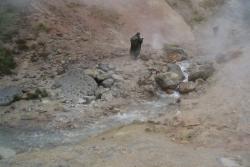Hot sulfur breath: Extremophilic archaea provide clues on evolution of sufur metabolism
The use of sufur compounds to produce energy is one of the most ancient types of metabolisms used by primitive microorganisms to thrive on the early anoxic Earth. How this microbial lifestyle has been evolving remains unclear.
T Hyperthermal acidic spring “Oreshek” (“Nutlet”), Kamhatka Peninsula, Russiahe increase of oxygen in the atmosphere approximately 2.5 billion years ago lead to the accumulation of sulfate, the most-oxidised form of sulfur. Sulfate reduction became the most important process in the global cycle of sulfur. It is a dominant microbial process in oxygen-free environments, such as marine and freshwater sediments. However, the geological evidence of microbial dissimilatory sulfate reduction (DSR) dates back to about 3.5 billion years ago, and predates the appearance of oxygen in the atmosphere.
Hyperthermal acidic spring “Oreshek” (“Nutlet”), Kamhatka Peninsula, Russiahe increase of oxygen in the atmosphere approximately 2.5 billion years ago lead to the accumulation of sulfate, the most-oxidised form of sulfur. Sulfate reduction became the most important process in the global cycle of sulfur. It is a dominant microbial process in oxygen-free environments, such as marine and freshwater sediments. However, the geological evidence of microbial dissimilatory sulfate reduction (DSR) dates back to about 3.5 billion years ago, and predates the appearance of oxygen in the atmosphere.
Since the early life was evolving under hot and anoxic conditions, it was therefore important to examine the microorganisms from modern ecosystems with similar conditions in the environments resembling those on early Earth. The study was therefore focussed on a new archaeon ‘Candidatus Vulcanisaeta moutnovskia’, an acid- and hot-temperatures-loving microorganism from acidic hot spring in Kamchatka Peninsula (Russia).
In an article published in Nature Microbiology, an international team of researchers led by Dr Nikolay Chernyh and Prof Elizaveta Bonch-Osmolovskaya of the Winogradsky Institute of Microbiology in Moscow, colleagues from Madrid, Vienna and Bangor University's Centre for Environmental Biotechnology (CEB) at the School of Natural Sciences revealed that the sulfate reduction in the hot spring is attributed to ‘Candidatus Vulcanisaeta moutnovskia’. The team used microbial community profiling coupled with growth experiments, radioisotopes and proteomics and analysis of evolutionary trajectory of DSR genes.
Sulfate reduction in Archaea is less known, as compared with Bacteria, the most numerous group of living organisms. However, the analysis of genomes suggests that the genes for the second reaction in DSR are more ancient in Archaea, and were probably even present in the hypothetical “Last Universal Common Ancestor” (LUCA) organism.
“Evidently, the sulfate reduction in the hot spring is facilitated by ‘Vulcanisaeta’ that have recruited some genetic loci for this process from bacteria, their neighbours in the environment, a very long time ago. ‘Vulcanisaeta‘ can possibly be considered a relic form of life in such environments and is a great model organism to study the evolution of sulfur metabolism”, comments Prof Peter Golyshin from CEB, Bangor University, who contributed to the analysis of proteomic data in this study.
The work involved researchers from the Russian Federal Research Center of Biotechnology and the Lomonosov Moscow State University (Russia), the Centro Nacional de Biotecnología (CSIC) and the Institute of Catalysis (CSIC), Madrid (Spain), the University of Vienna (Austria), ITQB NOVA (Portugal) and Bangor University (UK).
Original paper: Nature Microbiology, doi: 10.1038/s41564-020-0776-z
Publication date: 21 August 2020
